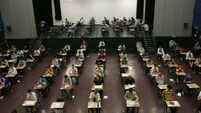Accommodations in the Leaving Cert for people with disabilities

Junior Cert student Niamh Kilcawley, who lost her sight when she was younger, completed her Junior Cert exams this month working with a scribe. Picture: Howard Crowdy
The family of a Junior Cert student who lost her sight due to a brain tumour has called for a review of how State exam accommodations are made for students who have a disability.
Niamh Kilcawley, 15, from Dungarvan, Co Waterford, completed her Junior Cert exams this month, working with a scribe.













